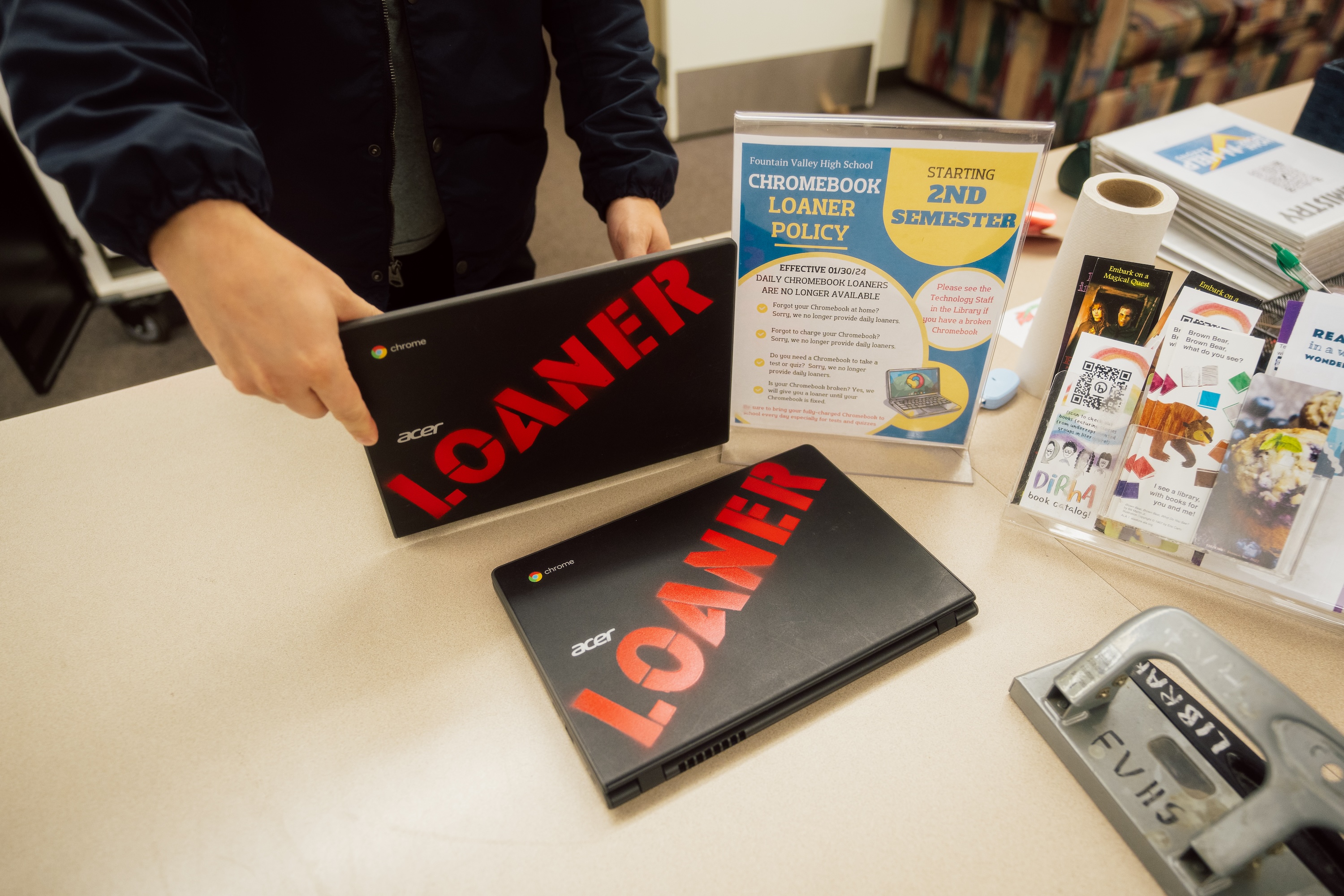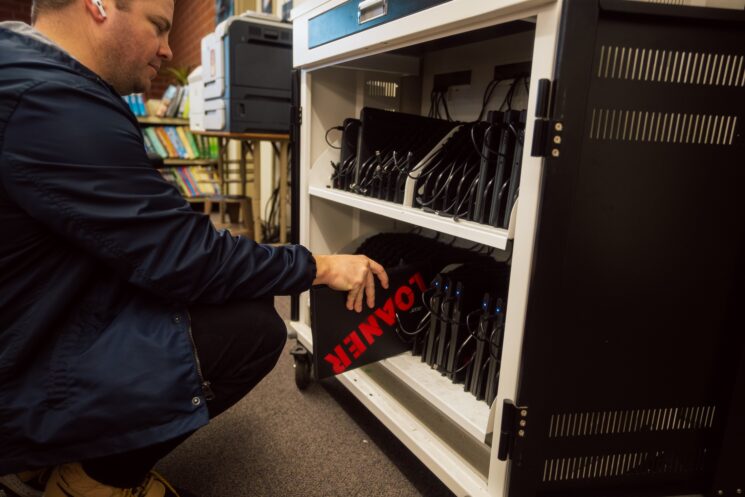
By Uy Pham
Beginning in the second semester, Fountain Valley High School (FVHS) enacted a new Chromebook loaner policy for students, restricting daily Chromebook loans unless students currently possess a broken Chromebook. Otherwise, students will be expected to bring their charged Chromebook to school every day, especially when completing assessments through a secure browser.
This policy marks a shift from the previous practice where students were allowed to visit the library to borrow a Chromebook; for example, when students forgot to bring a charged Chromebook to school for a test or quiz, a daily Chromebook loaner would help the student access the secure browser for their examination.
Now, the policy explicitly states that daily loaner Chromebooks will not be provided for forgetting to bring or charge Chromebooks, as Chromebooks are instructional material that should be brought to school daily.
The main reason for the implementation of the policy stems from the decreasing Chromebook supply due to students not returning their daily loaners.
“We’ve had a problem with students turning [Chromebooks] back in,” FVHS Principal Paul Lopez said. “At one point, we had 165 loaners for students … when I was there, only 22 were available … If we’re loaning Chromebooks, we’ve got to be responsible for getting them back.”
According to Lopez, the declining supply, which is a problem districtwide, results from some students borrowing multiple Chromebooks without returning them.
“A majority of our students are super responsible and bring their Chromebooks every day,” Lopez said. “We only have loaners for five percent of our campus, and it shouldn’t be the same five percent of students loaning Chromebooks every day.”
However, without a formal follow-up procedure, there has been a lack of accountability to ensure that Chromebooks are returned after a daily loan. There is currently no process to follow up with students who have checked out a Chromebook.
Despite some attempts to initiate this follow-up procedure, there also have been issues with Destiny, a database that keeps records of checkouts for both books and Chromebooks from the library.
“If a loaner Chromebook is checked out in the morning, it has to be turned in the afternoon,” Lopez said. “If a student checks one out, they’ve already got two and they need another one — we’ve got to draw a line somewhere … We have to come up with a system where we regain Chromebooks, [while] students can still take tests if they [forgot] their Chromebook.”
With a combination of obtaining more loaners to accommodate the larger student population, establishing an accountable return system and emphasizing the responsibility of bringing instructional materials daily, the hope is that the Chromebook loan supply will be increased.
Therefore, loaners would be again available to those who may accidentally forget their Chromebook or need one for repair.
“We are trying to get students responsible with their Chromebooks and charge them every night. It’s an instructional material and what you use in your classroom every day to access your resources,” Lopez said. “We really need to have our loaner Chromebooks for those that really need them.”

Students’ thoughts
Baron Banner surveyed some students to see their thoughts on the new Chromebook policy.
Some students agree that the policy will help to promote responsibility among students.
“I agree with this policy because I think that charging and bringing your Chromebook every day are as basic as bringing your binder or writing utensils,” senior Jason Nguyen said. “This policy discourages carelessness to allow the people who actually need loaners to get them.”
Other students pointed out that this policy will affect responsible students who forget and need temporary loaner Chromebooks instead of just addressing those who do not return the loaners.
“Personally this policy doesn’t affect me that much since I don’t mind bringing my Chromebook and personal laptop every day, and I don’t forget it,” senior Beth Arshagouni said. “However, I see the stressful faces of my fellow classmates who I know made a mistake, and I don’t think they should be punished based on other students that are repeat offenders.”
Overall, most students agree that the main solution should focus on establishing a coherent tracking system to address the low loaner Chromebook supply.
“I think the policy is okay as a temporary solution, but it’s not necessarily fair to punish the students who do try to bring their Chromebooks daily. Admin[istration] should do a better job at preventing students from borrowing more than one Chromebook at a time,” junior Reese Brummett said. “They should keep track of how many [Chromebooks] students have when the student tries to check one out and refuse to loan one to a student who already has a Chromebook.”
In response to students’ potential concerns, Lopez recognizes that some may believe this policy is inconvenient but believes that this will be resolved once Chromebooks can be located and returned.
“Once we get the Chromebooks, we’ll get back to doing regular business again,” Lopez said. “We don’t want students to fail or get zeros. All we want is for everybody to charge their Chromebooks, bring them to school and return the loaners that are out there.”





